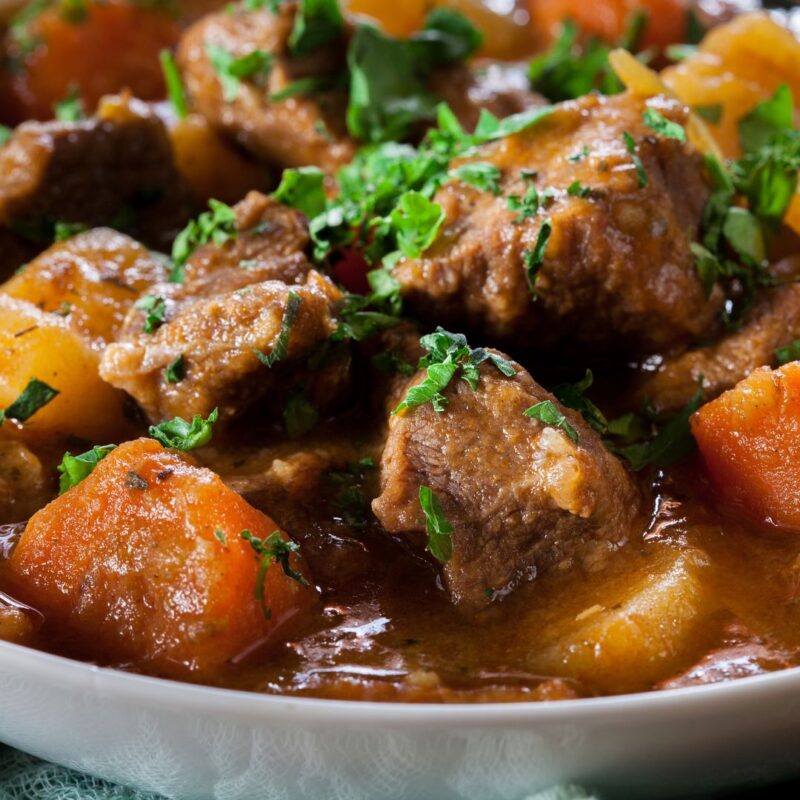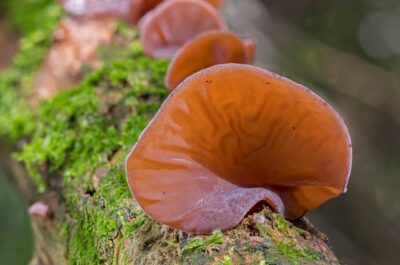
With the current temperature in Boulder, Colorado being subzero, this is a more perfect month for eating warm nutritious food. January is National Slow Cooker Month. Check out this delicious recipe. This can be made in a slow cooker or Instant Pot.
Different braising cuts of meat can always be used. If you use lamb shoulder, pork shoulder, boneless short ribs, or brisket, you can keep the cooking time the same if you cut the meat into 2-inch cubes. This stew is fabulous with bone-in short ribs, but you will need to increase the cooking time to 45 minutes under high pressure.
If you want to make this dish even faster, you can substitute chicken thighs for the beef.
I love daikon and carrots because they absorb all the flavor of the sauce, but you can substitute cubed potatoes or cauliflower florets in place of them and keep the same 3 minute cooking time under high pressure. When you don’t want to make greens on the side, stir in some bok choy or spinach to the stew and cook them on the sauté function until they’re wilted.
Although this recipe cooks under high pressure for 35 minutes, it takes time to prep the ingredients, sauté them in the Instant Pot, come up to high pressure, and release pressure naturally. All in all, it may take 90 minutes to complete this recipe (always check the Total Time on the recipe card before starting).
If you don’t have this much time to spare on a weeknight, dump all the ingredients in the slow cooker in the morning and program it to cook while you’re out for the day—the hands on time for prepping the stew is about 15 minutes! When you come home, the stew will be depressurized, piping hot, and ready to add the daikon and carrots. Alternatively, you can cook this stew ahead of time and reheat it when you need it.
If you want to cook this stew in a slow cooker/Crock Pot, sauté the onions and garlic in a skillet before transferring them to the slow cooker insert. Mix in the rest of the ingredients (except for the root vegetables) and cook on low for 8 to 10 hours. Add the carrots and daikon in the last hour of cooking.
Alternatively, you can make this stew in a Dutch oven on the stovetop or in an oven. Cook the onions and garlic in a heavy-bottomed dutch oven. When the onions are softened, add the rest of the ingredients, including the carrots and daikon. Increase the amount of All-Purpose Stir-Fry Sauce to 1 cup and add an additional cup of chicken or bone broth to the stew. Bring the contents of the stew to a boil over high heat and turn down the heat to maintain a simmer or place the pot in a 300°F oven . Place a lid on the pot, leaving it slightly askew so it doesn’t accidentally boil over. Cook for about 3 hours or until the meat is fork-tender.
Ingredients:
- All-Purpose Stir-Fry Sauce: This indispensable sauce is Michelle Tam’s short cut to deliciousness in this Asian-inspired stew. Alway shake up a jar and keep it in your fridge.
- Beef chuck roast: My favorite cut for beef stews is beef chuck roast, but cubed boneless short ribs or brisket also work. Not into beef? Cubed pork shoulder or lamb shoulder also work great in this recipe. Beef promotes energy, and “builds blood”.
- Umami Stir-Fry Powder or Spicy Sichuan Powder: Michelle loves to season the beef with one of her “nomtastic” seasoning salt because they add a lot of oomph compared with plain kosher salt.
- Avocado Oil: In traditional Chinese medicine, avocado is used to treat the GI tract and lungs. It lubricates the colon to treat constipation and stomach ulcers. Avocado also moistens the lungs to treat chronic coughs. The oils are considered nourishing to the Yin and therefore protective of an aging body.
- Onion: Onions, garlic, shallots and leeks are rich in sulfur—giving them their classic smell—while helping to detox the body.
- Garlic: known for its powerful anti-microbial and immune-enhancing properties. It prevents illness, lowers high cholesterol and blood pressure, cures ear and lung infections, and helps move Qi, preventing stagnation and inflammation.
- Dried shiitake mushrooms: help to balance Qi (energy)
- Daikon radish: If you can’t find daikon radish, you can definitely use Russet potatoes. Daikon radish is spicy and its color, white. Its healing essence matches the energies of both Late Summer and Fall, making it beneficial for both the Lung/Large Intestine and Stomach/Spleen. When eaten raw, radish cools heat in the Lung. When cooked, it supports the digestive system. (Click on the name to learn even more about this immune supporter, it is amazing!)
- Carrots: Carrots are good for the digestive system and support healthy Liver Function.
- Scallions: Known in ancient times to dispel pathogens, and often used as a treatment for measles, abcesses and colds, scallions have many medical applications. The white bottoms of scallion have a hot essence, thereby benefiting the Lung, which responds best to hot and spicy foods. The warm essence of the green scallion tops travels to the Liver meridian, helping to nourish and balance the Liver/Gallbladder organ system.
Recipe from from Michelle Tam‘s website Nom Nom Paleo.
Chinese Medicine Descriptions from:
Traditional Chinese Medicine World Foundation



